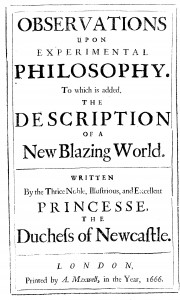Peter Anstey writes …
Two years ago on this blog I addressed the ‘Straw Man Problem‘ for the distinction between experimental and speculative philosophy. The apparent problem, according to some critics of the ESD, is that there were no speculative philosophers in the early modern period. In my response to that problem I listed The Duchess of Newcastle, Margaret Cavendish, as one of the few advocates of speculative philosophy in seventeenth-century England and in this post I want to explore her views in a little more depth.
Cavendish wrote the most sustained critique of experimental philosophy in the seventeenth century. Her Observations upon Experimental Philosophy, comprising 318 pages, was first published in 1666 and went into a second edition in 1668. In this work Cavendish gives a critical reading of many works of the new experimental philosophy in order to justify her own speculative natural philosophy. Within her sights are Robert Boyle’s Sceptical Chymist (1661), Henry Power’s Experimental Philosophy (1664) and Robert Hooke’s Micrographia (1665).
 It is interesting to compare Cavendish’s views in this work with those of the young Robert Boyle a decade earlier. As I pointed out in my last post, in his ‘Of Naturall Philosophie’ of c. 1654, Boyle claims that there are two principles of natural philosophy, the senses and reason. He plumps for the senses. Cavendish in her Observations acquiesces in the very same principles, but takes the opposing line: for her, reason trumps the senses.
It is interesting to compare Cavendish’s views in this work with those of the young Robert Boyle a decade earlier. As I pointed out in my last post, in his ‘Of Naturall Philosophie’ of c. 1654, Boyle claims that there are two principles of natural philosophy, the senses and reason. He plumps for the senses. Cavendish in her Observations acquiesces in the very same principles, but takes the opposing line: for her, reason trumps the senses.
What is important for our interests here is not only the direct contrast with Boyle’s embryonic experimental philosophy, but the manner in which, for Cavendish, the terms of reference for the choice are between experimental and speculative philosophy. The following extracts give a feel for her position:
I say, that sense, which is more apt to be deluded than reason, cannot be the ground of reason, no more than art can be the ground of nature: … For how can a fool order his understanding by art, if nature has made it defective? or, how can a wise man trust his senses, if either the objects be not truly presented according to their natural figure and shape, or if the senses be defective, either through age, sickness, or other accidents … And hence I conclude, that experimental and mechanic philosophy cannot be above the speculative part, by reason most experiments have their rise from the speculative, so that the artist or mechanic is but a servant to the student. (Cavendish, Observations, ed. O’Neill (Cambridge), p. 49, emphasis added)
experimental philosophy has but a brittle, inconstant, and uncertain ground. And these artificial instruments, as microscopes, telescopes, and the like, which are now so highly applauded, who knows but they may within a short time have the same fate; and upon a better and more rational enquiry, be found deluders, rather than true informers (ibid., p. 99)
And toward the end of a long discussion of chemistry and chemical principles she reiterates her conclusion:
if reason be above sense, then speculative philosophy ought to be preferred before the experimental, because there can no reason be given for anything without it (ibid., p. 241)
Cavendish’s Observations first appeared at a very sensitive time for the Royal Society, for it had been the subject of much criticism from without and was in the process of securing an apologetical History of the Royal-Society by Thomas Sprat.
Now, there is no doubt that some of the more prominent Fellows of the Society are in view in her critique. Yet, it is important that we do not over-extend the target of the Observations, for, it is very much aimed at experimental philosophy and hardly makes reference to the Royal Society at all. Within a year of its publication the Duchess was to make a famous visit to the Society and the correspondence that ensued does not suggest that Henry Oldenburg and others regarded her as a hostile critic of the Society. This reinforces the view that her focus was more specific, namely, experimental philosophy.
Interestingly, after Cavendish’s death the following lines appeared in A Collection of Letters and Poems (London, 1678) written in her honour:
Philosophers must wander in the dark;
Now they of Truth can find no certain mark;
Since She their surest Guide is gone away,
They cannot chuse but miserably stray.
All did depend on Her, but She on none,
For her Philosophy was all her own.
She never did to the poor Refuge fly
Of Occult Quality or Sympathy.
She could a Reason for each Cause present,
Not trusting wholly to Experiment,
No Principles from others she purloyn’d,
But wisely Practice she with Speculation joyn’d. (A Collection, p. 166, emphasis added)
This poem in which these lines appear was penned by the poet Thomas Shadwell, author of The Virtuoso. Shadwell presents the Duchess as holding to a more balanced view of the relative value of practice and speculation than is warranted from her writings. But the fact that he has singled this out is indicative of just how central was this issue to thinkers of the day.

